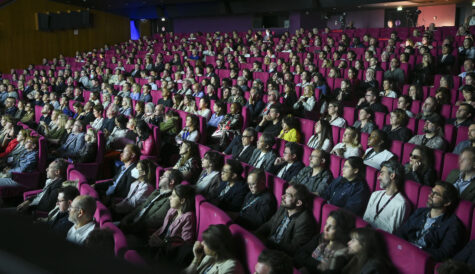
After more than 35 years of operation, TBI is closing its doors and our website will no longer be updated daily. Thank you for all of your support.
TBI Weekly: How MIPTV’s travails reflect the industry it seeks to serve
 For better or worse, MIPTV has undergone something of a revolution over the past 12 months.
For better or worse, MIPTV has undergone something of a revolution over the past 12 months.
Long a mainstay in the calendar for TV delegates the world over, the annual event is attempting to evolve just as the businesses that it serves are doing – and many of the questions facing the wider industry are equally applicable to organisers Reed Midem.
The Springtime jaunt to Cannes has for some time been in a state of flux, driven by a rapidly changing industry that’s populated by moneyed streamers focusing on original content, US studios dialling up their own vertically integrated OTT services and distributors caught somewhere in the middle.
Clearly, some deals still get done down in Cannes – but the nature of the content business means distributors trekking to the South of France are now probably more interested in talking to broadcasters and SVOD’s about their new projects than they are about flogging their finished tape. And buyers, equally, want to get onto the right projects as early as possible.
This, combined with the proliferation of markets, has caused a deflationary effect on MIPTV and something of a perfect storm for Reed Midem. Perhaps most notably, the surging popularity of drama-focused Series Mania – which is backed by the French state and held the week before MIPTV – has created a potential headache for anyone considering attending both events in what is already a crowded calendar. One suspects that headache has been felt most keenly, however, in the Reed Midem offices.
There has been no Big Bang moment at MIPTV but the cumulative effect on attendees – both buyers and sellers – has been clear for several years. The fact things haven’t changed more quickly has caused disgruntlement among some distributors and there has been no secret that others felt their large and costly stands – and the fees they were paying for the square footage – wasn’t an efficient way to get bang for their buck.
It’s a point Lucy Smith, deputy director of TV for Reed Midem, concedes. “We had feedback from clients that they were looking to change and that feedback has come over the past few years,” she says. Surveys were commissioned and the results were clear. “Sometimes you need to take a step back and assess more clearly,” she admits.
Several distributors had been cutting their MIPTV cloth before the changes were announced last year, with the likes of Endemol Shine and BBC Studios choosing to focus on markets elsewhere – in the latter’s case, its own giant Showcase extravaganza has understandably taken centre stage.
But it’s hardly surprising that some other major players have come to similar conclusions as details of the “reimagined market” emerged. The new-look was surely never an attempt to keep the same passengers on the same train travelling down the same track: some companies were always going to disembark and make alternative arrangements.
But rather than retreading the well-worn stories of whose stands will remain in storage during the last week of March, how does Smith now see the repurposed event panning out?
“The first thing we like to remind people is that MIPTV is the second largest content market after MIPCOM,” she says, reeling off companies ranging from A+E Networks and Discovery to All3Media, NBCUniversal and ViacomCBS as committed to the new-look event. Others include Spain’s Mediapro and Turkish duo Global Agency and InterMedya, but clearly this year’s MIPTV will mark a watershed for the event.
“We needed to allow people to take part in a way that made it work for them. That meant changing the footprint, we wanted to integrate a lot of new communal areas for people to use more,” Smith says. The new-look has been well-documented, with the market now taking place in Palais -1 and Riviera 7 and 8, but the target demographic remains similar.
“We still want to attract the distributors, the producers and we have hundreds of buyers, but what we’re saying is that distributors can take part in a different way now – it doesn’t have to be the huge stand that they have just because that’s what they need at MIPCOM.”
Those in the distribution game are of myriad opinions on the changes, which sees more conformity on the stand front. Some are aghast at the changes, others accept it as a necessary evolution. But Smith argues that even those companies not attending in their previous grand stand-backed guises will have a presence.
“They’re generally still sending people for the conferences or in presentations, or taking suites or offices and meeting space. But we’re also really developing the financing and development side, the In-Development strand is the gateway for financing and strategic partnerships, and that includes buyers who are becoming a bit more like commissioners and those investing early, such as distributors.”
Jeremy Darroch, CEO at Sky, will also be in town to collect a newly created gong for sustainability backed by the United Nations – the snappily titled MIPTV Sustainable Development Goals award – and there’s a concentrated focus on connecting people face to face. There is a ‘producers to watch’ strand with over 200 key figures across genres who are in town to connect with, while there will be an “Upfront-style” presentation of formats offering insights from companies including BBC Studios and ITV Studios.
“We’re doing more with matchmaking and using online recommendations too,” Smith says, highlighting a newly forged algorithm applied to the event’s online portal designed to push participants towards each other according to their business interests. “And it’s not only about people to people, but also matching up programmes and projects.”
Supervised ‘phygital’ networking sessions have been designed to encourage relationship building and a new strand of market intelligence sessions are also being introduced, with global analyst companies providing exclusive research to buyers about trends across the industry.
The addition of expanded networking areas and shifting the conference schedule to allow for more connections also reflects the way the wider business is changing, and Smith is adamant that Reed Midem wants to engage. “A few bumps in the road” are expected during this “year of transition,” she adds, but her message is clear: “We understand and we hear people.”
Come early April, we’ll know if the message has got through.



